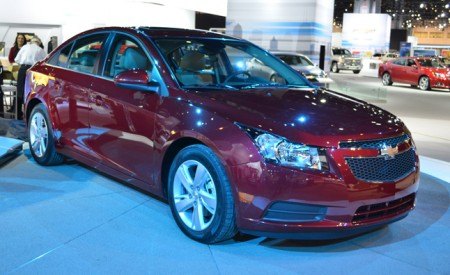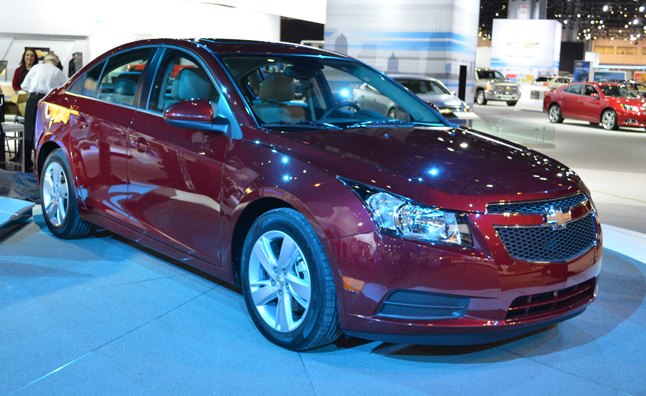If You've Got 115 Years To Spare, The Chevrolet Cruze Diesel Makes Sense
Some rough, back of the napkin calculations based on available information suggest that the Chevrolet Cruze Clean Turbo Diesel has a break-even point fit for Methuselah
Rather than blindly buy into the “rah-rah Europe” hype that surrounds so much of the diesel discourse, we decided to analyze just what kind of cost savings can be had by picking the diesel over an equivalent Cruze 2LT with the 1.4L Ecotec turbo engine. For argument’s sake, we used TrueCar’s formula of driving 15,000 miles per year, though we used Chicago, IL as our sample for gas and diesel prices. The lowest prices found on GasBuddy was $3.50 for regular and $3.80 for diesel respectively.
Since city and combined figures haven’t been announced yet for the Cruze diesel, I decided to only use the highway figures for a similarly equipped 2LT . As the calculations show, the Cruze diesel does use a smaller quantity of fuel annually, but that’s offset by the price premium one is required to pay for diesel. The significant delta in the MSRP of the two vehicles is another blow against the oil-burning Cruze. With a mere $22 in annual fuel savings and a $2,550 price gap, it would take over a century -roughly 115 years – for a potential owner to “break even” on the Cruze diesel.
GM has only released the highway mpg figure (42 mpg) so far. But even if one repeats the exercise using the Jetta TDI’s fuel economy numbers (30/42/34 mpg) for the Cruze diesel, it would still take roughly a decade to break even and save about $255 annually over a gasoline Cruze. Green cars aren’t necessarily about the financial proposition (see: Toyota Prius for the best example), but the Cruze diesel is attempting to lure away extremely loyal buyers in a niche segment with very low opportunities for “green status signalling” (i.e. letting everyone know you’re saving baby polar bears via your consumption choices, ala the Prius). In light of all this, it seems that the Cruze Diesel is facing a dim future of slow sales and plenty of cash on the hood to help move them.
Edit: The data is in the photo gallery below, but commenter redav created this chart as well showing the cost-per-mile breakdown.
More by Derek Kreindler
Latest Car Reviews
Read moreLatest Product Reviews
Read moreRecent Comments
- Theflyersfan I know their quality score hovers in the Tata range, but of all of the Land Rovers out there, this is the one I'd buy in a nanosecond, if I was in the market for an $80,000 SUV. The looks grew on me when I saw them in person, and maybe it's like the Bronco where the image it presents is of the "you're on safari banging around the bush" look. Granted, 99% of these will never go on anything tougher than a gravel parking lot, but if you wanted to beat one up, it'll take it. Until the first warning light.
- Theflyersfan $125,000 for a special M4. Convinced this car exists solely for press fleets. Bound to be one of those cars that gets every YouTube reviewer, remaining car magazine writer, and car site frothing about it for 2-3 weeks, and then it fades into nothingness. But hopefully they make that color widespread, except on the 7-series. The 7-series doesn't deserve nice things until it looks better.
- Master Baiter I thought we wanted high oil prices to reduce consumption, to save the planet from climate change. Make up your minds, Democrats.
- Teddyc73 Oh look dull grey with black wheels. How original.
- Teddyc73 "Matte paint looks good on this car." No it doesn't. It doesn't look good on any car. From the Nissan Versa I rented all the up to this monstrosity. This paint trend needs to die before out roads are awash with grey vehicles with black wheels. Why are people such lemmings lacking in individuality? Come on people, embrace color.




































Comments
Join the conversation
You can't really blame the guy. He is like most in that he believes the EPA mileage figures. Figures that the car companies themselves submit without a lot of corroborating proof. Just look at the problems that car companies are now getting in over falsely submitted Hybrid and other supposedly fuel economical vehicles. Here are other points to consider: 1) Diesel does get better gas mileage that the EPA estimates. Simply put, unless you drive only limited commuting miles and/or short trips around town (say 10 miles one way), you will be getting from 10% to 20% higher MPGs than the EPA estimates. Also, to their credit VW / Audi has been honestly following the EPA testing rules and sumitting those results rather than attempting to beef up the numbers improperly as some companies have. However, VW / Audit would likely be more right than not if they did. 2) Hybrids still have gasoline engines, tiny ones at that. If you drove a hybrid like you would drive a diesel, how long do you think those gas engines would really last? When the tiny gas engines do go you could yank out the used batteries (with perhaps 40 to 50K more miles left) and sell them for $300 on eBay. I don't think many people would consider keeping the car. 3) Diesel engines just flat out last longer than any hybrid or electric car out there. Even at an inflated estimate of the life of a purely electric car, it would only last to 180,000 miles. The top 50% of mileage maximums for diesel begins at around 300,000. How's that for saving the planet? We could reduce the amount of unusable used car parts and metals taking up room in our landfills by half and that doesn't consider the potentially harmful contaminants of a hybrid or electric battery rotting away. 4) Have you ever had an emissions test? They hook up your car's exhaust for 5 minutes or so to a system to read those emissions. They never consider the fact that a diesel will go about 33% farther than gas during that same 5 minutes. So if the actual pollutants from a gas engine as tested would be increased by that 33%, they would most likely not be able to pass. But do the 8 states who reject diesel engines take that into consideration? I don't believe so. I guess you can tell I believe in diesel. Thanks for reading my rant.
Yeah I know. I didn't really make a sound argument there. What I meant was that gallon for gallon, the pollutants from diesel may be greater than gas but diesel would go 33% farther and actually end up with less pollutants for each mile traveled.